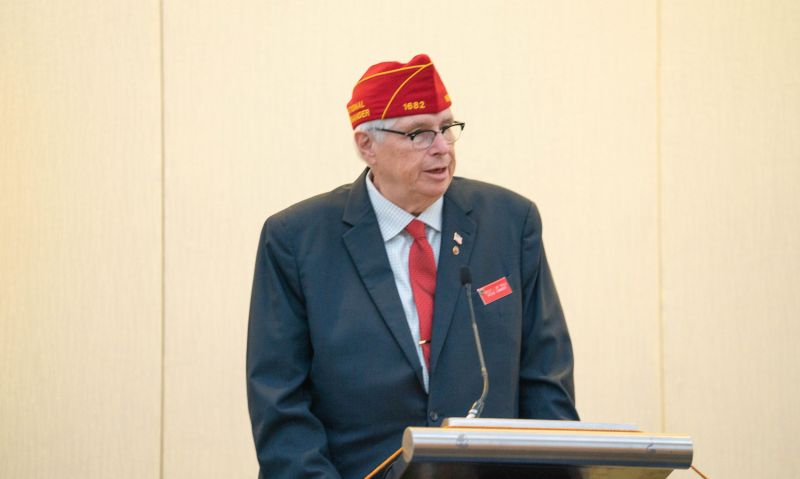
Ensuring quality of life for servicemembers
American Legion National Commander Vincent J. “Jim” Troiola stopped by the National Security Commission, which he used to serve as chairman. During a brief address during the Legion’s Washington Conference on Feb. 27, Troiola relayed some of his experiences while meeting with Marines and sailors in Okinawa, Japan; various troops in Hawaii; Coastguardsmen on the Oregon coast and others.
“What I want to talk with you about today is what I consider a matter of national security,” he said. “And that is the satisfaction of active-duty military families. The satisfaction rate of military families at military bases all over the United States is at the lowest it’s been in decades, at 52 perecent.”
At Pearl Harbor, Troiola said, he learned that the drinking water is contaminated due a tank dating back to World War II that is filled with fuel. Thousands of military families have been relocated, the commander said.
“This is a hot-button issue,” he said. “I do know that every military member is trained to keep their focus on the mission but how do you focus on the mission when there are problems going on at home? It’s a national security problem.”
National Security Chairman Matthew Shuman of the Department of Arizona emphasized the need for improvements to the accountability aspect. Government agencies like the Department of Defense Inspector General’s Office and the Government Accountability Office can hold branches accountable. However, there is not an external organization like The American Legion that can support and work with DoD on these issues.
Shuman compared it to a teaching moment for a parent when they assign a task to a child.
“When you call the child back and ask them if it’s done, they say ‘yes,’ but you never go back and check,” he said. “That’s sort of how it works. When there is an issue at a DoD facility, like troops not getting proper access to food, or services on posts are not available or the brick and mortar barracks are crumbling, there is no one that goes there — except for DoD — and says we fixed it.”
The American Legion is planning to fill that void, as early as this summer.
Right now, its National Security team is coordinating a series of trips to bases where they will work with DoD on improvements related to quality of life issues. The vision is for these trips to be similar to System Worth Saving (SWS) visits that the Legion’s Veterans Affairs & Rehabilitation Commission has conducted for 20 years. The intent of SWS trips is to collect information, work with VA on improvements, and report findings to Congress, the public and others.
“We are going to start doing that with our DoD facilities,” Shuman said. “This is amazing. It will elevate this commission in the eyes of the public, the Legion, the DoD, Congress and America.”
Pat McGuigan, a military and veterans legislative assistant for Sen. John Boozman, R-Ark., also discussed quality of life issues with the commission.
“Flags don’t fly themselves and ships don’t sail themselves,” said McGuigan, an Army veteran. It’s people. Everything we do in the military comes back to people. I don’t know of a war we participated in that we didn’t have boots on the ground. It comes back to people. We have to take care of our people.”
McGuigan talked about ensuring that investment is made into factors that support the quality of life for servicemembers and their families.
“We need to make sure we are doing right by our servicemembers and their families by caring for them,” he said, noting that the senator’s staff visited various bases last year to get a better understanding of the conditions. “We’re going to do that again this year and are going to work with the Legion to support this new initiative and see how we can work together in supporting these quality of life measures and ensure we are taking care of our servicemembers and their families.”
